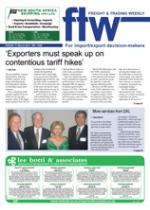The port landlord, Transnet
National Ports Authority
(TNPA), could be on the
fringe of disobeying the
Ports Regulator’s decision
on individual export tariff
increases.
These contentious tariff
increases applied for by the
TNPA are not play-play
amounts. Some of the bigger
export products from SA, for
example, that are affected
include the liquid bulk
molasses tariff, which leapt
up by an enormous 864.60%;
breakbulk logs by 644.8%; and
dry bulk timber woodchips by
612.37%. Even at the lower end
of the scale, the big SA export
of dry bulk chrome ore saw its
tariff walloped up by 117.2%.
And if it gets to go ahead
with implementing some of
these increases from April 1,
certain big export businesses
could get blown clean out
of the water, according to
industry commentators.
The issue started when the
TNPA submitted its requested
tariff increases to the Ports
Regulator (PR) for approval.
It wanted a general tariff
increase of 11.91% – but listed
a large number of claimed
individual import and export
tariff increases, some of which
far exceeded that average
amount.
But the PR didn’t agree with
the TNPA’s calculations.
It first of all cut the claimed
11.91% general tariff increase
to 4.49%, and did not accept
the authority’s claim for
separate individual tariffs.
However, the PR’s answer
to the TNPA submission was
one of those classic pieces
of legalistic jargon, which
left importers and exporters
somewhat mystified. This
at a time of the year when
they are in the process of
revising their budgets, and
the tariffs play a crucial role
in this regard. And, until the
individual TNPA tariffs have
been resolved, no importer
or exporter can prepare any
meaningful budget.
The PR’s published
determination read: “In the
absence of a clearly articulated
model that sets out the
application of all factors in specific tariff determinations,
the Regulator would have
to make determinations on
all tariffs that differ from a
generalised tariff increase on a
case-by-case basis. In addition,
no information allowing
assessment of individual
tariffs was given for some
of the requested increases or
decreases against the overall
requested tariff.
“The Regulator decision
is therefore restricted to
approving an overall increase
with general application across
all tariffs.
“The TNPA has indicated
that it has commenced a tariff
review project that will address
these concerns. The review
methodology considers, among
other factors, the facilities
used, the commodity value
and the throughput, although
the specifics have not as yet
been made available to the
Regulator. The Regulator
acknowledges that a tariff
review project is under way,
but has not been provided with
the details of what tariffs are to
be amended, in what manner,
the factors to be taken into
consideration in such a review
as well as their application to
specific tariffs and the time
frames of such processes.”
This could have two
possible interpretations,
according to maritime legal
specialist, Andrew Robinson,
director of Deneys Reitz.
The first is that the PR did
not directly approve these
individual tariffs, so the TNPA
cannot implement the claimed
increases. Secondly, the PR
has only approved a general
tariff increase of 4.49% – so
any amounts exceeding this
figure cannot be implemented.
This translation was also
confirmed to FTW by the PR.
But the ball’s now very
much in the hands of the
TNPA.
It appears that the ports
authority currently has the
PR’s findings before its
legal team, and everyone –
including the PR – is waiting
for the TNPA’s answer to the
issue.
“We’ve written to the
TNPA’s lawyers who are
looking at this,” said Robinson.
“We are waiting for their
reply.”
But importers and exporters
who are unhappy with the
claimed TNPA tariff increases
should not just sit back waiting
to see what the authority
does on April 1, according to
another maritime lawyer.
“My view”, he told FTW,
“is that exporters must file
complaints individually against
the tariff once it has come
into effect. These complaints
should be filed in terms of
section 47 of the National Ports
Act (NPA).
“I don’t believe that either
the Regulator or the TNPA is
going to do anything further in
respect of these anomalies in
tariffs, and exporters therefore
have little choice but to file
complaints.
“It should be noted that in
terms of the directives issued
pursuant to the Act (NPA),
complaints must be lodged
within three months of the
incident or conduct complained
of. Therefore, exporters should
not let this sit but should get
their complaint proceedings
under way as soon as possible.
I think that it is arguable that
the three-month period starts
to run on April 1, 2011.”
‘Exporters must speak up on contentious tariff hikes’
11 Mar 2011 - by Alan Peat
0 Comments
FTW - 11 Mar 11

11 Mar 2011
11 Mar 2011
11 Mar 2011
11 Mar 2011
11 Mar 2011
11 Mar 2011
Border Beat
Featured Jobs
New
New
